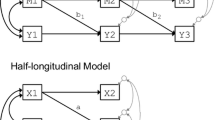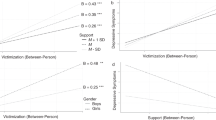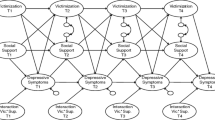Abstract
Underpinned by the transactional model of stress (Lazarus and Folkman in Stress, appraisal, and coping, Springer, Berlin, 1984), the aim of this pre-registered study was to test the role of cognitive appraisals (threat, challenge, control, blame, and perceived social support) in the longitudinal relationship between peer-victimization and depressive symptomatology. Measures of peer-victimization, cognitive appraisal (threat, challenge, control, blame, and perceived social support), and depressive symptomatology were included in a self-report questionnaire, and data were collected at three-time points each one month apart. Participants were 530 adolescents aged 11–14 who reported experiencing peer-victimization at the beginning of this study. Results of the cross-lagged panel analyses found both an association between peer-victimization and depressive symptomatology after three months, alongside an association between depressive symptomatology and later peer-victimization. Perceived social support from parents/guardians, teachers, or close friends did not significantly moderate this relationship. Peer-victimization at the start of the study was significantly associated with challenge, but not threat, appraisals one month later. Both threat and challenge appraisals in the second month of the study were related to depressive symptomatology at the end of the study, one month later. A small significant total indirect effect via threat and challenge appraisal was found, though neither was a significant mediator on its own. This study highlights the role of challenge and threat appraisals in adolescents’ adaptation to peer-victimization.
Similar content being viewed by others

References
Alter, A. L., Aronson, J., Darley, J. M., Rodriguez, C., & Ruble, D. N. (2010). Rising to the threat: Reducing stereotype threat by reframing the threat as a challenge. Journal of Experimental Social Psychology, 46(1), 166–171. https://doi.org/10.1016/j.jesp.2009.09.014.
Björkqvist, K., Lagerspetz, K. M., & Kaukiainen, A. (1992). Do girls manipulate and boys fight? Developmental trends in regard to direct and indirect aggression. Aggressive Behavior, 18(2), 117–127. https://doi.org/10.1002/1098-2337(1992)18:2%3c117::AID-AB2480180205%3e3.0.CO;2-3.
Bokhorst, C. L., Sumter, S. R., & Westenberg, P. M. (2010). Social support from parents, friends, classmates, and teachers in children and adolescents aged 9 to 18 years: Who is perceived as most supportive? Social Development, 19(2), 417–426. https://doi.org/10.1111/j.1467-9507.2009.00540.x.
Bowen, N. K., & Masa, R. D. (2015). Conducting measurement invariance tests with ordinal data: A guide for social work researchers. Journal of the Society for Social Work and Research, 6(2), 229–249. https://doi.org/10.1086/681607.
Bronfenbrenner, U. (1979). The ecology of human development. Cambridge: Harvard University Press.
Catterson, J., & Hunter, S. C. (2010). Cognitive mediators of the effect of peer victimization on loneliness. British Journal of Educational Psychology, 80(3), 403–416. https://doi.org/10.1348/000709909X481274.
Cheng, S. T., Cheung, K. C. C., & Cheung, C. K. (2008). Peer victimization and depression among Hong-Kong adolescents. Journal of Clinical Psychology, 64(4), 766–776. https://doi.org/10.1002/jclp.20489.
Cobb, S. (1976). Social support as a moderator of life stress. Psychosomatic Medicine, 38, 200–314. https://doi.org/10.1097/00006842-197609000-00003.
Cohen, S. (2004). Social relationships and health. American Psychologist, 59, 676–684. https://doi.org/10.1037/0003-066X.59.8.676.
Cohen, S., & Wills, T. A. (1985). Stress, social support, and the buffering hypothesis. Psychological Bulletin, 98(2), 310–357. https://doi.org/10.1037/0033-2909.98.2.310.
Davidson, L. M., & Demaray, M. K. (2007). Social support as a moderator between victimization and internalizing–externalizing distress from bullying. School Psychology Review, 36(3), 383–405. https://doi.org/10.1080/02796015.2007.12087930.
Demaray, M. K., & Malecki, C. K. (2006). A review of the use of social support in anti-bullying programs. Journal of School Violence, 5(3), 51–70. https://doi.org/10.1300/J202v05n03_05.
Didymus, F. F., & Fletcher, D. (2012). Getting to the heart of the matter: A diary study of swimmers’ appraisals of organisational stressors. Journal of Sports Sciences, 30(13), 1375–1385. https://doi.org/10.1080/02640414.2012.709263.
Espelage, D. L., Holt, M. K., & Henkel, R. R. (2003). Examination of peer-group contextual effects on aggression during early adolescence. Child Development, 74(1), 205–220. https://doi.org/10.1111/1467-8624.00531.
Espelage, D. L., & Swearer, S. M. (2003). Research on school bullying and victimization: What have we learned and where do we go from here? School Psychology Review, 32(3), 365–383. https://doi.org/10.1080/02796015.2003.12086206.
Fearnow-Kenney, M., & Kliewer, W. (2000). Threat appraisal and adjustment among children with cancer. Journal of Psychosocial Oncology, 18(3), 1–17. https://doi.org/10.1300/J077v18n03_01.
Fekkes, M., Pijpers, F. I., & Verloove-Vanhorick, S. P. (2005). Bullying: Who does what, when and where? Involvement of children, teachers and parents in bullying behavior. Health Education Research, 20(1), 81–91. https://doi.org/10.1093/her/cyg100.
Folkman, S., Lazarus, R. S., Dunkel-Schetter, C., DeLongis, A., & Gruen, R. J. (1986). Dynamics of a stressful encounter: Cognitive appraisal, coping, and encounter outcomes. Journal of Personality and Social Psychology, 50(5), 992–1003.
Fosco, G. M., & Feinberg, M. E. (2015). Cascading effects of interparental conflict in adolescence: Linking threat appraisals, self-efficacy, and adjustment. Development and Psychopathology, 27(1), 239–252. https://doi.org/10.1017/S0954579414000704.
Gariépy, G., Honkaniemi, H., & Quesnel-Vallee, A. (2016). Social support and protection from depression: Systematic review of current findings in Western countries. The British Journal of Psychiatry, 209(4), 284–293. https://doi.org/10.1192/bjp.bp.115.169094.
Gee, B., Reynolds, S., Carroll, B., Orchard, F., Clarke, T., Martin, D., et al. (2020). Practitioner review: Effectiveness of indicated school-based interventions for adolescent depression and anxiety—A meta-analytic review. Journal of Child Psychology and Psychiatry. https://doi.org/10.1111/jcpp.13209.
Gerard, J. M., Buehler, C., Franck, K., & Anderson, O. (2005). In the eyes of the beholder: Cognitive appraisals as mediators of the association between interparental conflict and youth maladjustment. Journal of Family Psychology, 19(3), 376–384. https://doi.org/10.1037/0893-3200.19.3.376.
Giannotta, F., Settanni, M., Kliewer, W., & Ciairano, S. (2012). The role of threat appraisal in the relation between peer victimization and adjustment problems in early Italian adolescents. Journal of Applied Social Psychology, 42(9), 2077–2095. https://doi.org/10.1111/j.1559-1816.2012.00931.x.
Grob, A., Flammer, A., & Wearing, A. J. (1995). Adolescents’ perceived control: Domain specificity, expectations, and appraisal. Journal of Adolescence, 18(4), 403–425. https://doi.org/10.1006/jado.1995.1030.
Haroz, E. E., Ybarra, M. L., & Eaton, W. W. (2014). Psychometric evaluation of a self-report scale to measure adolescent depression: The CESDR-10 in two representative adolescent samples in the United States. Journal of Affective Disorders, 158, 154–160. https://doi.org/10.1016/j.jad.2014.02.009.
Hawker, D. S., & Boulton, M. J. (2000). Twenty years’ research on peer victimization and psychosocial maladjustment: A meta-analytic review of cross-sectional studies. The Journal of Child Psychology and Psychiatry and Allied Disciplines, 41(4), 441–455. https://doi.org/10.1111/1469-7610.00629.
Hayes, A. F. (2013). Introduction to mediation, moderation, and conditional process analysis: A regression-based approach. London: The Guildford Press.
Hinduja, S., & Patchin, J. W. (2008). Cyberbullying: An exploratory analysis of factors related to offending and victimization. Deviant Behavior, 29(2), 129–156. https://doi.org/10.1080/01639620701457816.
Hood, B., Power, T., & Hill, L. (2009). Children’s appraisal of moderately stressful situations. International Journal of Behavioral Development, 33(2), 167–177. https://doi.org/10.1177/0165025408098011.
Holt, M. K., & Espelage, D. L. (2007). Perceived social support among bullies, victims, and bully-victims. Journal of Youth and Adolescence, 36(8), 984–994. https://doi.org/10.1007/s10964-006-9153-3.
Hunt, C., Peters, L., & Rapee, R. M. (2012). Development of a measure of the experience of being bullied in youth. Psychological Assessment, 24(1), 156–165. https://doi.org/10.1037/a0025178.
Hunter, S. C., & Boyle, J. M. (2002). Perceptions of control in the victims of school bullying: The importance of early intervention. Educational Research, 44(3), 323–336. https://doi.org/10.1080/0013188022000031614.
Hunter, S. C., & Boyle, J. M. E. (2004). Appraisal and coping strategy use in victims of school bullying. British Journal of Educational Psychology, 74, 83–107. https://doi.org/10.1348/000709904322848833.
Hunter, S. C., Boyle, J. M. E., & Warden, D. (2004a). Help seeking amongst child and adolescent victims of peer-aggression and bullying: The influence of school-stage, gender, victimization, appraisal, and emotion. British Journal of Educational Psychology, 74(3), 375–390. https://doi.org/10.1348/0007099041552378.
Hunter, S. C., Boyle, J. M. E., & Warden, D. (2007). Perceptions and correlates of peer-victimization and bullying. British Journal of Educational Psychology, 77(4), 797–810. https://doi.org/10.1348/000709906X171046.
Hunter, S. C., Durkin, K., Heim, D., Howe, C., & Bergin, D. (2010). Psychosocial mediators and moderators of the effect of peer victimization upon depressive symptomatology. The Journal of Child Psychology and Psychiatry, 51(10), 1141–1149. https://doi.org/10.1111/j.1469-7610.2010.02253.x.
Hunter, S. C., Mora-Merchan, J., & Ortega, R. (2004b). The long-term effects of coping strategy use in victims of bullying. The Spanish Journal of Psychology, 7(1), 3–12.
Jamieson, J. P. (2017). Challenge and threat appraisals. In A. J. Elliot, C. S. Dweck, & D. S. Yeager (Eds.), Handbook of competence and motivation: Theory and application (2nd ed., pp. 175–191). New York: Guildford Publications.
Juvonen, J., & Graham, S. (2014). Bullying in schools: The power of bullies and the plight of victims. Annual Review of Psychology, 65, 159–185. https://doi.org/10.1146/annurev-psych-010213-115030.
Kaltiala-Heino, R., Fröjd, S., & Marttunen, M. (2010). Involvement in bullying and depression in a 2-year follow-up in middle adolescence. European Child & Adolescent Psychiatry, 19(1), 45. https://doi.org/10.1007/s00787-009-0039-2.
Kelloway, E. K. (2015). Using Mplus for structural equation modelling: A researcher’s guide. Thousand Oaks: Sage.
Kenny, D. A. (2018). Mediation. Davidkenny.net. http://davidakenny.net/cm/mediate.htm#DI.
Kim, K. L., Jackson, Y., Conrad, S. M., & Hunter, H. L. (2008). Adolescent report of interparental conflict: The role of threat and self-blame appraisal on adaptive outcome. Journal of Child and Family Studies, 17(5), 735–751. https://doi.org/10.1007/s10826-007-9187-5.
Klomek, A. B., Marrocco, F., Kleinman, M., Schonfeld, I. S., & Gould, M. S. (2007). Bullying, depression, and suicidality in adolescents. Journal of the American Academy of Child and Adolescent Psychiatry, 46(1), 40–49. https://doi.org/10.1097/01.chi.0000242237.84925.18.
Lakey, B., & Cohen, S. (2000). Social support theory and selecting measures of social support. In S. Cohen, L. U. Gordon, & B. H. Gottlieb (Eds.), Social support measurement and interventions: A guide for health and social scientists (pp. 29–52). Oxford: Oxford University Press.
LaFontana, K. M., & Cillessen, A. H. (2010). Developmental changes in the priority of perceived status in childhood and adolescence. Social Development, 19(1), 130–147. https://doi.org/10.1111/j.1467-9507.2008.00522.x.
Lazarus, R. S., & Folkman, S. (1984). Stress, appraisal, and coping. Berlin: Springer.
Lim, C. S., Graziano, P. A., Janicke, D. M., Gray, W. N., Ingerski, L. M., & Silverstein, J. H. (2011). Peer victimization and depressive symptoms in obese youth: The role of perceived social support. Children’s Health Care, 40(1), 1–15. https://doi.org/10.1080/02739615.2011.537929.
Little, T. D. (2013). Longitudinal structural equation modeling. London: Guildford Press.
Malecki, C. K., & Demaray, M. K. (2002). Measuring perceived social support: Development of the child and adolescent social support scale (CASSS). Psychology in the Schools, 39(1), 1–18. https://doi.org/10.1111/j.1469-7610.2010.02253.x.
Marini, A. A., Dane, A. V., Bosacki, S. L., & Cura, Y. L. C. (2006). Direct and indirect bully-victims: Differential psychosocial risk factors associated with adolescents involved in bullying and victimization. Aggressive Behavior, 32(6), 551–569. https://doi.org/10.1002/ab.20155.
Maxwell, S. E., & Cole, D. A. (2007). Bias in cross-sectional analyses of longitudinal mediation. Psychological Methods, 12(1), 23–44. https://doi.org/10.1037/1082-989X.12.1.23.
Muthén, B. O., Muthén, L. K., & Asparouhov, T. (2017). Regression and mediation analysis using Mplus. Los Angeles, CA: Muthén & Muthén.
Newman, M. L., Holden, G. W., & Delville, Y. (2005). Isolation and the stress of being bullied. Journal of Adolescence, 28(3), 343–357. https://doi.org/10.1016/j.adolescence.2004.08.002.
Noret, N., Hunter, S. C., & Rasmussen, S. (2018a). The relationship between peer victimization, cognitive appraisals, and adjustment: A systematic review. Journal of School Violence, 17(4), 451–471. https://doi.org/10.1080/15388220.2017.1423492.
Noret, N., Hunter, S. C., & Rasmussen, S. (2018b). Thoughts and feelings about bullying. Retrieved from https://osf.io/cx9fe.
Noret, N., Hunter, S. C., & Rasmussen, S. (2020). The role of perceived social support in the relationship between being bullied and mental health difficulties in adolescents. School Mental Health, 12(1), 156–168. https://doi.org/10.1007/s12310-019-09339-9.
Oliver, C., & Candappa, M. (2007). Bullying and the politics of ‘telling.’ Oxford Review of Education, 33(1), 71–86. https://doi.org/10.1080/03054980601094594.
Östberg, V., Låftman, S. B., Modin, B., & Lindfors, P. (2018). Bullying as a stressor in mid-adolescent girls and boys—Associations with perceived stress, recurrent pain, and salivary cortisol. International Journal of Environmental Research and Public Health, 15(2), 364–375. https://doi.org/10.3390/ijerph15020364.
Palmwood, E. N., & McBride, C. A. (2019). Challenge vs. threat: The effect of appraisal type on resource depletion. Current Psychology, 38(6), 1522–1529. https://doi.org/10.1007/s12144-017-9713-6.
Pierce, G. R., Sarason, I. G., & Sarason, B. R. (1991). General and relationship-based perceptions of social support: Are two constructs better than one? Journal of Personality and Social Psychology, 61(6), 1028–1039. https://doi.org/10.1037/0022-3514.61.6.1028.
Pössel, P., Burton, S. M., Cauley, B., Sawyer, M. G., Spence, S. H., & Sheffield, J. (2018). Associations between social support from family, friends, and teachers and depressive symptoms in adolescents. Journal of Youth and Adolescence, 47(2), 398–412. https://doi.org/10.1007/s10964-017-0712-6.
Prinz, K., Costa, D., Chervonsky, E., & Hunt, C. (2019). Construction and psychometric properties of a short form of the personal experiences checklist. Journal of Interpersonal Violence. https://doi.org/10.1177/0886260519875559.
Przybylski, A. K., & Bowes, L. (2017). Cyberbullying and adolescent well-being in England: A population-based cross-sectional study. The Lancet Child and Adolescent Health, 1(1), 19–26. https://doi.org/10.1016/S2352-4642(17)30011-1.
Putnick, D. L., & Bornstein, M. H. (2016). Measurement invariance conventions and reporting: The state of the art and future directions for psychological research. Developmental Review, 41, 71–90. https://doi.org/10.1016/j.dr.2016.06.004.
Reijntjes, A., Kamphuis, J. H., Prinzie, P., & Telch, M. J. (2010). Peer victimization and internalizing problems in children: A meta-analysis of longitudinal studies. Child Abuse and Neglect, 34, 244–252. https://doi.org/10.1016/j.chiabu.2009.07.009.
Rigby, K. (2003). Consequences of bullying in schools. Canadian Journal of Psychiatry, 48(9), 583–590.
Rueger, S. Y., Malecki, C. K., & Demaray, M. K. (2010). Relationship between multiple sources of perceived social support and psychological and academic adjustment in early adolescence: Comparisons across gender. Journal of Youth and Adolescence, 39(1), 47–61. https://doi.org/10.1007/s10964-008-9368-6.
Rueger, S. Y., Malecki, C. K., Pyun, Y., Aycock, C., & Coyle, S. (2016). A meta- analytic review of the association between perceived social support and depression in childhood and adolescence. Psychological Bulletin, 142(10), 1017–1067. https://doi.org/10.1037/bul0000058.
Schoeler, T., Duncan, L., Cecil, C. M., Ploubidis, G. B., & Pingault, J.-B. (2018). Quasi-experimental evidence on short- and long-term consequences of bullying victimization: A meta-analysis. Psychological Bulletin, 144(12), 1229–1246. https://doi.org/10.1037/bul0000171.
Seiffge-Krenke, I. (2013). Stress, coping, and relationships in adolescence. Hove: Psychology Press.
Slavin, L. A., & Rainer, K. L. (1990). Gender differences in emotional support and depressive symptoms among adolescents: A prospective analysis. American Journal of Community Psychology, 18(3), 407–421. https://doi.org/10.1007/BF00938115.
Smith, C. A., Haynes, K. N., Lazarus, R. S., & Pope, L. K. (1993). In search of the “hot” cognitions: Attributions, appraisals, and their relation to emotion. Journal of Personality and Social Psychology, 65(5), 916–929. https://doi.org/10.1037/0022-3514.65.5.916.
Söderberg, P., & Björkqvist, K. (2020). Victimization from peer aggression and/or bullying: Prevalence, overlap, and psychosocial characteristics. Journal of Aggression, Maltreatment and Trauma, 29(2), 131–147. https://doi.org/10.1080/10926771.2019.1570410.
Solberg, M. E., & Olweus, D. (2003). Prevalence estimation of school bullying with the Olweus Bully/Victim Questionnaire. Aggressive Behavior, 29(3), 239–268. https://doi.org/10.1002/ab.10047.
Storch, E. A., & Ledley, D. R. (2005). Peer victimization and psychosocial adjustment in children: Current knowledge and future directions. Clinical Pediatrics, 44(1), 29–38. https://doi.org/10.1177/000992280504400103.
Tanigawa, D., Furlong, M. J., Felix, E. D., & Sharkey, J. D. (2011). The protective role of perceived social support against the manifestation of depressive symptoms in peer victims. Journal of School Violence, 10(4), 393–412. https://doi.org/10.1080/15388220.2011.602614.
Taylor, K. A., Sullivan, T. N., & Kliewer, W. (2013). A longitudinal path analysis of peer victimization, threat appraisals to the self, and aggression, anxiety, and depression among urban African American adolescents. Journal of Youth and Adolescence, 42, 178–189. https://doi.org/10.1007/s10964-012-9821-4.
Terranova, A. M., Harris, J., Kavetski, M., & Oates, R. (2011). Responding to peer victimization: A sense of control matters. Child and Youth Care Forum, 40(6), 419–434. https://doi.org/10.1007/s10566-011-9144-8.
Ttofi, M. M., Farrington, D. P., Lösel, F., & Loeber, R. (2011). Do the victims of school bullies tend to become depressed later in life? A systematic review and meta-analysis of longitudinal studies. Journal of Aggression, Conflict and Peace Research, 3(2), 63–73. https://doi.org/10.1108/17596591111132873.
Volk, A. A., Veenstra, R., & Espelage, D. L. (2017). So you want to study bullying? Recommendations to enhance the validity, transparency, and compatibility of bullying research. Aggression and Violent Behavior, 36, 34–43. https://doi.org/10.1016/j.avb.2017.07.003.
Ybarra, M. L., & Mitchell, K. J. (2014). “Sexting” and its relation to sexual activity and sexual risk behavior in a national survey of adolescents. Journal of Adolescent Health, 55(6), 757–764. https://doi.org/10.1016/j.jadohealth.2014.07.012.
Yeung, R., & Leadbeater, B. (2010). Adults make a difference: The protective effects of parent and teacher emotional support on emotional and behavioral problems of peer victimized adolescents. Journal of Community Psychology, 38(1), 80–98. https://doi.org/10.1002/jcop.20353.
Author information
Authors and Affiliations
Corresponding author
Additional information
Publisher's Note
Springer Nature remains neutral with regard to jurisdictional claims in published maps and institutional affiliations.
Rights and permissions
About this article
Cite this article
Noret, N., Hunter, S.C. & Rasmussen, S. The Role of Cognitive Appraisals in the Relationship Between Peer-Victimization and Depressive Symptomatology in Adolescents: A Longitudinal Study. School Mental Health 13, 548–560 (2021). https://doi.org/10.1007/s12310-021-09414-0
Accepted:
Published:
Issue Date:
DOI: https://doi.org/10.1007/s12310-021-09414-0



